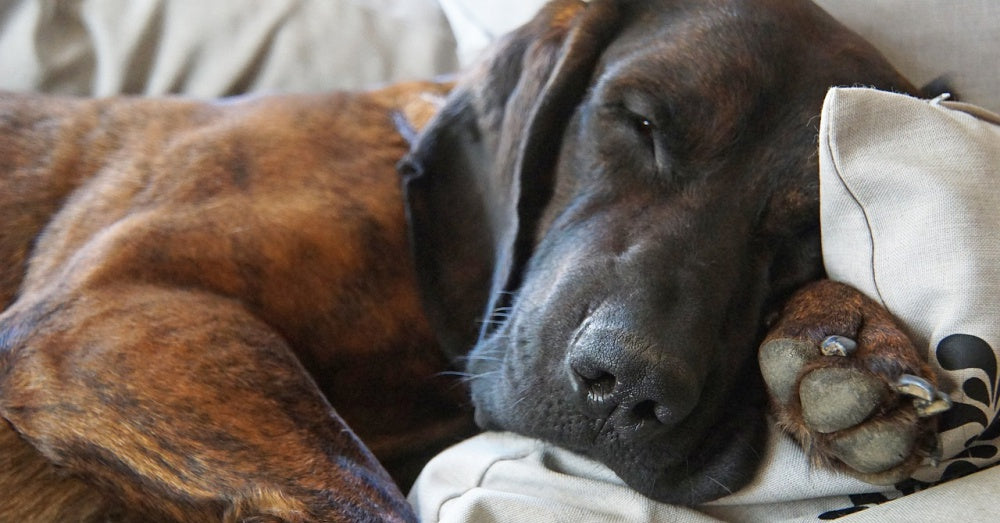Dog Sleep Behavior: What's Normal & What's Not
Andrea Powell
Dogs spend their days eating, playing, but mostly sleeping.
While the average adult human sleeps less than seven hours per night, dogs sleep an astounding 12-14 hours each day. Doggone lucky, right?!
It is perfectly normal for a dog to sleep at night with their humans and then take naps throughout the day. The amount of hours varies a bit by breed, age, and activity level.
 Photo: Pixabay
Photo: PixabayAside from the peace of mind we get from watching our dogs sleep, we can learn more about our dog's personality and health from their sleeping habits.
Why Do Dogs Sleep So Much?
Some dogs sleep out of boredom, while others like seniors and large breed dogs just need more sleep. Working dog breeds are more active and typically sleep less than other breeds. A healthy dog typically sleeps for 12-14 hours, so don't stress if you see Fido taking a few naps in the sun.
If you want to spice up your dog's day, consider getting a puzzle toy or going for a midday walk.
 Photo: Pixabay
Photo: PixabayAnother reason dogs snooze so much is because they fall asleep quickly but also wake up at the slightest noise. "Entering sleep, they take about 10 minutes to transition from the slow wave — during which breathing slows, blood pressure drops, and heart rate decreases — into rapid eye movement (REM). In the REM phase, their eyes roll under closed lids, and their body might react to dreams," explains AKC.
Dogs spend only 10 percent of their sleep in REM so they need to doze more often to make up for it.
"You can’t put all dogs into one bucket — a lot depends on their age, their health, and just who they are," dog trainer Nicole LaRocco-Skeehan told AKC. "Certain breeds have tendencies toward being more or less energetic, and so much depends on the individual dog."
Do Dogs Dream?
YES!
Just like us, dogs dream the most when they are in the REM phase. They often dream about common dog activities. You may see Fido's legs twitch and hear muffled barks as he dreams of chasing squirrels.
Psychology Today states you can spot your dog dreaming by waiting and watching. "Just watch him from the time he starts to doze off. As the dog's sleep becomes deeper his breathing will become more regular. After a period of about 20 minutes for an average-sized dog, his first dream should start. You will recognize the change because his breathing will become shallow and irregular."
They go on to say, "There may be odd muscle twitches, and you can even see the dog's eyes moving behind its closed lids if you look closely enough. The eyes are moving because the dog is actually looking at the dream images as if they were real images of the world."
 Photo: Pixabay
Photo: PixabayDog Sleep Positions
Your dog's favorite sleeping position may give you a glimpse into how they are feeling. Dogs may change positions depending on where they're sleeping or who they are sleeping by. There are seven common sleeping positions with each meaning something different.
Should Your Dog Sleep In Your Bed?
There are numerous studies that prove sharing your bed with your dog is the right choice. The National Institutes of Health found that 56% of dog owners sleep with their dogs.
 Photo: Pexels
Photo: PexelsThe benefits outweigh the biggest concern, which is disrupted sleep.
Benefits include:
- Reduces Depression
- Promotes Theta Brainwaves
- Maximizes Comfort
- Lowers Blood Pressure
- Reduces Stress
and many more...
 Photo: Pexels
Photo: PexelsHealth Issues That Cause Dogs To Sleep More
Age plays a big role in how much a dog sleeps with puppies and seniors both sleeping over 15 hours a day. But if you suddenly notice your dog sleeping more, it may be worth a trip to the vet for an examination.
Here are some health conditions that may cause your dog to be more sleepy:
- canine depression
- separation anxiety
- diabetes
- hypothyroidism
- loss of hearing
 Photo: Pexels
Photo: PexelsIn Conclusion
Don't fret about your dog sleeping for over half the day. While we all are a little jealous of the extra shut-eye, there is no need for concern unless your dog starts to sleep excessively. Keep track of your dog's sleep schedule and if things start to change, talk to your vet.
Otherwise, let your sleeping dog lie.


